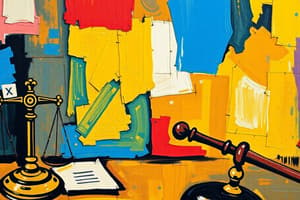Podcast
Questions and Answers
In the process of completing a jurat, what is the essential action a notary public must undertake immediately before witnessing the signature?
In the process of completing a jurat, what is the essential action a notary public must undertake immediately before witnessing the signature?
- Verify the signer's identification documents thoroughly.
- Explain the contents of the document to the signer to ensure understanding.
- Ensure the document is completely filled out and correctly dated.
- Administer an oath or affirmation to the document signer. (correct)
What is the primary purpose of a notary administering an oath or affirmation to a signer in the context of a jurat?
What is the primary purpose of a notary administering an oath or affirmation to a signer in the context of a jurat?
- To make the document legally binding and enforceable in a court of law.
- To validate the signer's identity and prevent fraudulent document submissions.
- To ensure the signer understands the legal implications of perjury related to the document's content. (correct)
- To confirm the notary public's legal authority to perform notarizations.
According to the guidelines provided, which scenario would be considered an acceptable method for a notary public to administer an oath or affirmation?
According to the guidelines provided, which scenario would be considered an acceptable method for a notary public to administer an oath or affirmation?
- Verbally reciting an approved oath in the signer's physical presence. (correct)
- Mailing the oath to the signer with instructions to return a signed copy.
- Providing a pre-written oath form for the signer to read and sign without verbal interaction.
- Reading the oath aloud while in a separate room from the signer, relying on audio.
A notary public is asked to complete a jurat for a document that was previously signed by the client and brought to the notary. In accordance with the described procedures, can the notary proceed with notarization?
A notary public is asked to complete a jurat for a document that was previously signed by the client and brought to the notary. In accordance with the described procedures, can the notary proceed with notarization?
In which of the following situations would it be permissible for a notary public to complete a jurat?
In which of the following situations would it be permissible for a notary public to complete a jurat?
Consider a scenario where a signer is willing to affirm the truth of a document but objects to swearing an oath. Can a notary public proceed with the jurat process?
Consider a scenario where a signer is willing to affirm the truth of a document but objects to swearing an oath. Can a notary public proceed with the jurat process?
What is the potential legal consequence for a signer who makes false statements in a document that has been sworn under oath or affirmation before a notary public?
What is the potential legal consequence for a signer who makes false statements in a document that has been sworn under oath or affirmation before a notary public?
Which of the following actions by a notary public would be considered a violation of the proper procedure for completing a jurat?
Which of the following actions by a notary public would be considered a violation of the proper procedure for completing a jurat?
In the context of notarization, what is the key distinction between an 'oath' and an 'affirmation' as presented in the provided text?
In the context of notarization, what is the key distinction between an 'oath' and an 'affirmation' as presented in the provided text?
A notary public, even if personally acquainted with a signer, must still adhere to specific procedures when completing a jurat. Which of these procedures can be waived if the notary knows the signer well?
A notary public, even if personally acquainted with a signer, must still adhere to specific procedures when completing a jurat. Which of these procedures can be waived if the notary knows the signer well?
Flashcards
Oath Requirement for Jurat
Oath Requirement for Jurat
A notary public must administer an oath or affirmation before completing a jurat.
Jurat Signing Process
Jurat Signing Process
The signer swears or affirms to the truth of the document's contents, and then signs it in the notary's presence.
Purpose of Oath and Signature
Purpose of Oath and Signature
Ensures the notary verifies the signer's oath and signature, preventing fraud.
Prohibition of Absentee Jurat
Prohibition of Absentee Jurat
Signup and view all the flashcards
Oath definition
Oath definition
Signup and view all the flashcards
Study Notes
- A notary public is required to administer an oath or affirmation before completing a jurat.
- The oath or affirmation is obtained from the witness, under penalty of perjury, confirming the truth of the document's contents.
- There is no specific wording required for the oath or affirmation outside of legal proceedings.
- Acceptable wording for an oath is: “Do you solemnly swear or affirm that the contents of this document are the truth, the whole truth, and nothing but the truth, so help you God."
- An acceptable affirmation is: “Do you solemnly swear or affirm, under penalty of perjury, that the contents of this document are the truth, the whole truth, and nothing but the truth?”
- After the oath or affirmation, the notary public must watch the signer sign the document.
- A notary public cannot complete a jurat for a document if the signer did not personally appear, take the oath or affirmation, and sign in the notary's presence.
- This rule applies even if the notary knows the signer.
Studying That Suits You
Use AI to generate personalized quizzes and flashcards to suit your learning preferences.




